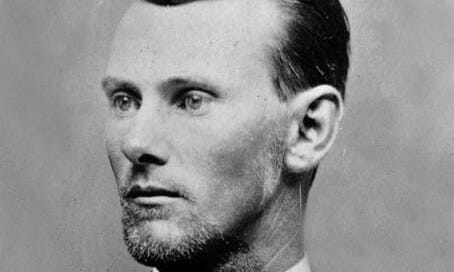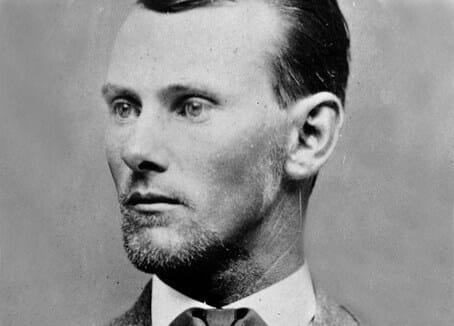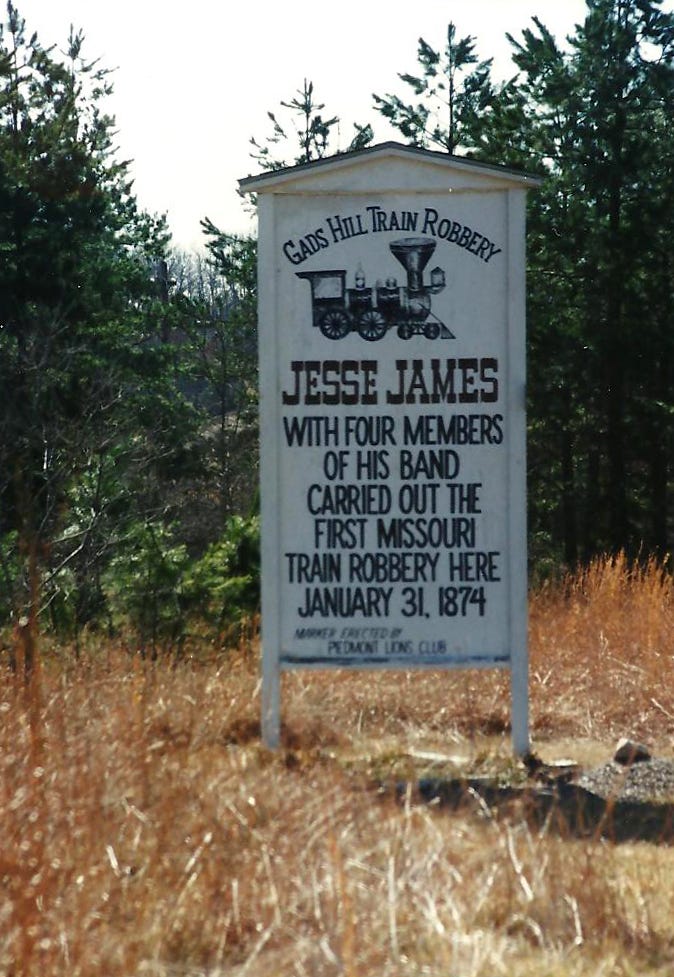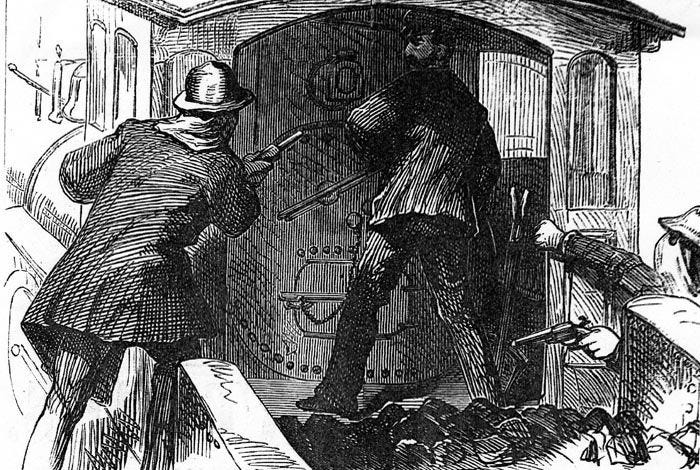Jesse James and the Legacy of Missouri Train Robbers
How Missouri Became "The Train Robber State"
How did Missouri get it’s short lived nickname as the Train Robber State? Well, much like Jack’s own criminal career it all starts with Jesse James.
The date is January 31, 1874. New York City has recently annexed The Bronx, the first Kindergarten in the USA opened in St. Louis the summer prior, the first ever public zoo in the USA is about to open in Philadelphia, and the James-Younger Gang has just committed their first train robbery in Missouri.
Jesse and Frank James along with the Younger brothers Cole, Jim, John, and Bob had formed one of the most infamous outlaw gangs in American history by the mid 1870s. Originating around 1861 as a group of Confederate guerilla fighters terrorizing communities along the Missouri and Kansas border during the Civil War, this gang would stay largely intact until the failed robbery of the First National Bank in Northfield, Minnesota in 1876.
The James brothers were born and raised in Clay County, Missouri in the are that is now Kearney. Their time in the Civil War as young men was brutal and saw them serving under noted Confederate military leaders such as William Quantrill, Bloody Bill Anderson, and Fletch Taylor. Clay County had been a hot-spot for Confederate sympathy as many living there were Southern transplants, many of whom used enslaved men and women for their farm and house work. Even as Missouri had only a 10% enslaved population, Clay County had 25% itself. This concentration of pro-slavery communities lead to some of the most tragic battles in Missouri and Kansas history, and it also birthed many of the outlaws of the post-civil war era.
After the Civil War, Jesse and Frank’s former commander Archie Clement retained his bushwacker gang of Confederate guerillas together and committed a series of robberies and murders against Republican(Union) allied individuals and institutions throughout the region. It is unknown if Jesse or Frank themselves joined this gang, but in 1869 the James brothers made their proper debut with the robbery of the Davies County Savings Association in Gallatin, Missouri. This robbery sparked the heavily publicized criminal careers of the James boys.
Let’s circle back and skip forward to 1874. Jesse and Frank James along with three of the Younger brothers find themselves in Gads Hill, Missouri where they rob a grocery store before plotting to rob the 4PM arriving train. After the train arrived late, the gang lit a bon fire on the tracks and slowed the engineer to a stop with lanterns. They then swiftly robbed the passengers, claiming to not rob women or working men(identified by how calloused their hands were), and broke into the safe to escape with a total of $12,000 (roughly $280,000 today). All five robbers made it out unscathed.
This robbery marked the first reported train robbery in the state of Missouri. Train robbery had not been a common method of the James-Younger gang, with their first robbery only being a year prior in Iowa and the first ever peace-time US train robbery being in 1866. Despite these gangs not specializing in train robbery it is one of their aspects that myth and legend has most clung to over the years.
By the time Jack Kennedy was old enough to fantasize about his future, dime novels and newspaper puff pieces heralding Jesse James as the modern Robin Hood had already been spreading across the country. The James family lived mere miles from the Cracker Neck district of Independence, MO where the Kennedy farmhouse sat. No one in the region could avoid hearing about the James and Younger boys, so it is no wonder Jack latched onto their legacy.
While Jack himself would never meet Jesse or Frank James, only Jesse James Jr., he did encounter them from a distance as a young boy. The home of John and Bridget Kennedy sat on a 130 acre farm near the Glendale Railroad. Exactly five years to the day from the Northfield, Minnesota disaster, Jesse and Frank James plotted to rob the train passing by Jack’s childhood home.
Blue Cut was a thirty-mile curve down the train tracks that forced trains to slow down to twenty-five miles per hour or so. That night, the six gang members, Jesse, Frank, Dick Liddil, the Hite brothers (Wood and Clarence), and newcomer Charlie Ford arrived at the cut. Jesse and Clarence took positions on the north side of the cut and Frank and Dick were on the south side. It was the job of Wood and Charlie to take car of the engine and express car. A short time later, a Chicago & Alton Railroad owned train came down through the cut. One robber, probably Clarence, stood on the tracks waving a lantern, signaling to the train to stop. When the engineer, Chappy Foote, saw the man in the tracks was wearing a mask, he knew the train was about to be robbed and put the brakes on. When the train stopped, the robbers jumped on board. Jesse and Wood went over to Foote and, oddly, introduced themselves as Jesse James and Dick Liddil.
They then ordered Foote to get them a hammer and a coal pick (probably to use to open the safe if the need arose). Foote tried to work slow, in order to give the express messenger a chance to get away so the safe could not be opened. When Jesse picked up on what Foote was doing, he threatened to kill him if he didn't hurry up. He reportedly also told Foote that the gun he was aiming at Foote was the same gun used to kill conductor William Westfall in the Winston train robbery. Shortly thereafter, Foote was taken to the express car and forced to open it. By the time the bandits reached the express car, the express messenger, H. A. Fox, had fled down the train. Foote was ordered to call him back or be killed, and this Foote did. Fox returned to the car and opened the safe. He did so and upon seeing the little amount of money inside it, one of the robbers, said to be Charlie Ford, hit Fox over the head with his pistol.
Jesse then ordered the gang to rob the passengers. Over the next few minutes, many passengers were relieved of their money, watches, and jewelry. Many passengers were overlooked for some reason. Jesse, the only bandit without a mask, reportedly boasted to the passengers that he was the infamous Jesse James. After robbing the passengers, Jesse shook Foote's hand, gave him two dollars, and said that his gang was going to ruin the Chicago & Alton Railroad. The six outlaws then jumped off the train and vanished. While this would prove to be the last robbery committed by the James Brothers, it is possible it inspired their successor.
Ten-year-old(probably) Jack Kennedy supposedly awoke to the sound of gun fire on that fated night of September 7th, 1881. He fell back asleep to dreams of standing alongside Jesse, pistols in hand, living out the legend for himself. Undoubtedly he heard of the successful robbery days later and was glad. This instance, along with the atmosphere of hero worship filling the region, cemented Jack’s future likely more than any other circumstance of his upbringing.







